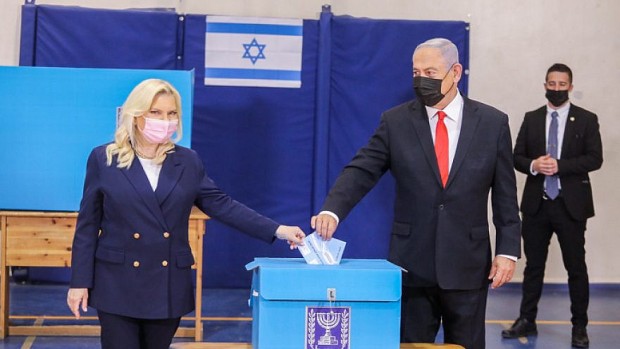Defendant No. 1 or next prime minister? Netanyahu divides Israel

By Isabel Kershner
JERUSALEM — It was a split-screen spectacle that encapsulated the confounding condition of Israel and its democracy.
Prime Minister Benjamin Netanyahu appeared in a Jerusalem court Monday (5) for the opening of the key, evidentiary phase of his corruption trial. Simultaneously, just 2 miles across town, representatives of his party were entreating the country’s president to task him with forming Israel’s next government.
For many here, the extraordinary convergence of events was an illustration of a political and constitutional malaise afflicting the nation that gets worse from year to year.
After four inconclusive elections in two years, Netanyahu, Israel’s longest-serving prime minister, who is charged with bribery, fraud and breach of trust, and who denies wrongdoing, remains the most polarizing figure on the political stage. But he is also the leader of Israel’s largest party, which took the most seats in national elections last month.
With Netanyahu’s future on the line, analysts say his best bet for overcoming his legal troubles is to remain in power and gain some kind of immunity.
But with neither the pro-Netanyahu bloc of parties or the grouping opposing him able to muster a coalition that could command a viable parliamentary majority, Israel appears stuck, unable to fully condone him or to remove him from the scene.
Now, experts said, the country’s democratic system is in the dock.
“Netanyahu and his supporters are not claiming his innocence but are attacking the very legitimacy of the trial and of the judicial system,” said Shlomo Avineri, professor emeritus of political science at Hebrew University.
“It is the right of the prime minister to come to court and plead not guilty,” he said. “But his defence is an attack on the legitimacy of the constitutional order.”
Netanyahu later made a statement that was broadcast live accusing the prosecution of carrying out a “witch hunt” against him and attempting to oust him by means of a judicial coup.
He accused the prosecution of acting illegally by erasing recordings, ignoring testimonies that did not fit their thesis and blackmailing witnesses, among other things. “That is how they try to bring down a strong prime minister from the right. That is what an attempted administrative coup looks like.”
Israel was nearing an unprecedented constitutional crisis, Avineri said, its depth underlined by the symbolism of the two processes unfolding in parallel.
The law gives President Reuven Rivlin a lot of leeway in whom he nominates to form a government. Rivlin, an old rival of Netanyahu, said he would act as all former presidents did and task whoever had the best chance of forming a government that would gain the confidence of the new parliament.
The drama of the State of Israel v. Benjamin Netanyahu revolves around three cases in which Netanyahu stands accused of trading official favours in exchange for gifts from tycoons. The gifts ranged from deliveries of expensive cigars and Champagne to the less tangible one of flattering coverage in leading news outlets.
The first case being tried, known as Case 4000, is the weightiest and the only one in which he has been charged with bribery.
According to the indictment, Netanyahu used his power as prime minister and communications minister at the time to aid Shaul Elovitch, a media tycoon and friend, in a business merger that profited Elovitch to the tune of tens of millions of dollars. In return, Walla, a leading Hebrew news site owned by Elovitch’s telecommunications company, provided the Netanyahu family with favourable coverage, particularly around election time.
The long-anticipated court session opened Monday with a lengthy speech by the chief prosecutor, Liat Ben-Ari. Netanyahu, who was required to be present, sat at the back of the courtroom.
Describing the case as “significant and grave,” Ben-Ari said that according to the indictment, Netanyahu, listed as “Defendant No. 1,” had “made improper use of the great governmental power entrusted to him,” to demand favours from the owners of media outlets to advance his personal affairs, including “his desire to be re-elected.”
Netanyahu left the court before the first witness, Ilan Yeshua, the former CEO of Walla, took the stand. With more than 330 witnesses expected to appear, the trial could go on for years.
Yeshua described how he would receive instructions from go-betweens to post or highlight positive stories about Netanyahu and his wife, Sara, as well as items that cast his political rivals in a negative light.
He said he relayed the requests to the newsroom and described his daily and hourly struggles with editors as a “nightmare”.
The parallel political process underway at Rivlin’s official residence did little to dispel the sense that Israel remained trapped in a loop of political uncertainty and instability.
One after the other, delegations of the 13 parties elected to the Knesset came Monday to announce which candidate they endorsed to form the next government.
Netanyahu, whose Likud party won 30 seats in the 120-seat Parliament, was assured of 52 recommendations from his right-wing and ultra-Orthodox allies. It remained to be seen how many his opponents could muster.
-New York Times

